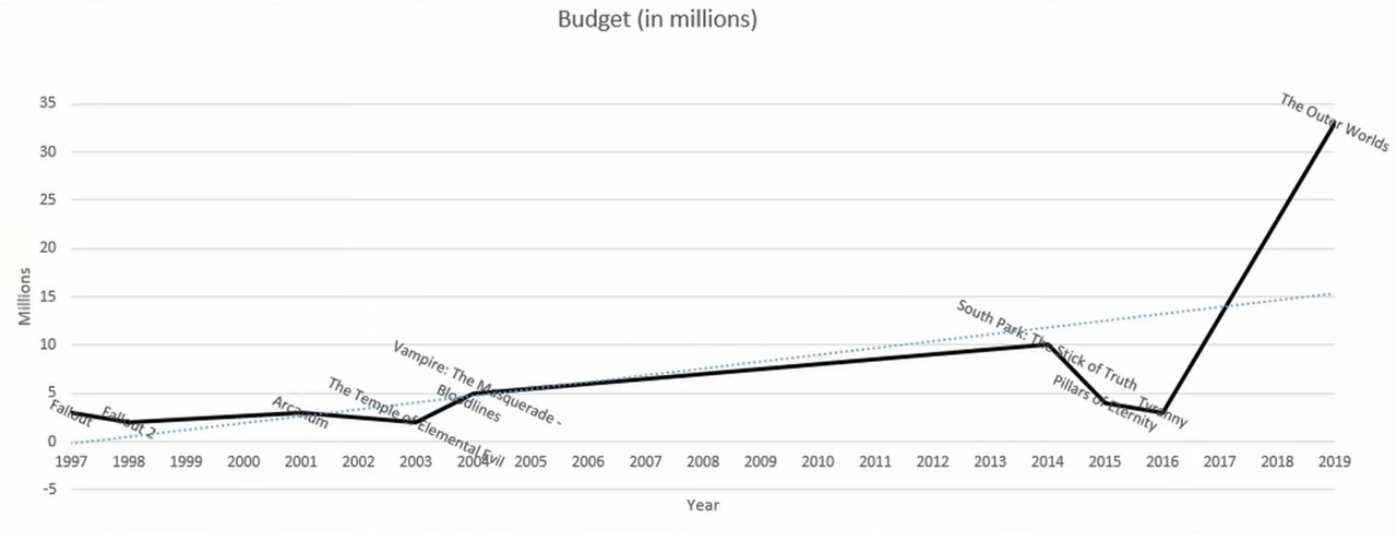Cain wants to look at the hard factual data of his games.
Wanted to look at all the games he worked on, but he has games with his code in them like Pillars 2 and Starfleet Academy but he didn't really work on, he just providing them something or he worked on them very briefly and was then moved off, will not be including those. Some games credited him in thanks like Fallout 3 or New Vegas, won't include these. Won't include any non-RPGs or expansions. Wildstar was such an outlier in many ways and hard to quantify because he doesn't know the final budget and the team size was huge but he wasn't sure how big, will not be included. Basically looking over the math of nine RPGs in this video.
First looks at development time, chart at 2:37. Time is divided into months, Fallout 2 was the quickest in 12 months, longest was South Park in 48 months (an estimate, was worked on for about a year before he got there.) Very slight upward trend in development time, but it's generally variable. RPGs seem to take between 28-35 months from that chart which makes sense to Cain.
Next, development team. Will look at credit size, but lots of people get credited, Cain just wants to look at specifically the development time. Chart at 4:20. Goes from 14 to 75 people, with the exception of Fallout to Arcanum, team size has a strong trend upward. When he went to go look at credit size(Chart at 5:09), the range is quite large, goes from 142 to 791. For almost every game he made, the factor of development team vs. credits is a factor of 10. However, there are often cases of repeats in the credits, but even accounting for that, there are many people needed to bring a game to market.
Next comes budget(chart at 6:40), Cain looked up information publicly. Double checked it against what he knew privately since publishers are publicly traded and have to mention it in shareholder events, and it seems to match. Doesn't have access to the information on the games he wasn't a director or company owner on. Ranged from $2 million to $33 million (Outer Worlds), again general trend is upward.
Next comes sales in millions of units (chart at 7:22), trend is 100,000 units (Vampire Bloodlines) to over 5 million (Outer Worlds and South Park.) Trend is generally up even considering the dip between south park to pillars/tyranny.
Final chart is review score on metacritic (8:30), specifically the PC version review score. The range is 71 from ToEE to 89 for a tie between Fallout 1 and Pillars of Eternity 1. Very very minor trend upwards.
What conclusions can you draw from this? No correlation between metacrtic score and games sales/budget/development team size. Obviously a correlation between budget and team size. No connection to scores and copies sold, Bloodlines scored well, worst selling RPG in Cain's career. No correlation between score and budget. No correlation between score and team size, Fallout and Arcanum scored better than teams with big games. Score doesn't seem to affect sales.
Development time and score both seem to go upwards slightly. Some games he rushed out early in his career, later games he generally took longer on.
Temple of Elemental Evil and Tyranny were two of the fastest games he did, and they have the lowest scores. Fallout 2 was done in a year, but got a high score.





















